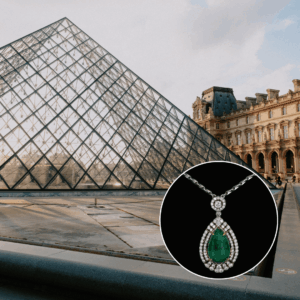27 Oct WHAT WOULD HAPPEN IF YOU INHERITED ITEMS STOLEN FROM THE LOUVRE? POSSESSION ISN’T ALWAYS 9/10ths OF THE LAW
Precious jewels (including the Crown of Louis XV) were stolen from the Louvre on October 19, 2025. What if you inherited from a loved one some of the stolen jewels? If you knew the inherited item was stolen and you made no efforts to notify law enforcement, then you could be prosecuted in addition to the stolen item being seized by the government.

If you inherited the Crown of Louis XV or valuable artwork such as the Mona Lisa, there is no doubt you should be suspicious and immediately report your suspicions to law enforcement. Even if inherited jewels and artwork that weren’t so unique but raised any level of suspicion, you should attempt to trace how the property came into the possession of the deceased person from whom you inherited, to see if the property inherited was stolen. Professionals can often determine ownership and if the property was stolen or was merely an imitation. If there was little reason for suspicion (perhaps it wasn’t as valuable) and you didn’t know it was stolen or in your possession, prosecution would be unlikely. However, upon finding out the inherited item was stolen, then you should quickly notify law enforcement, as honesty is the best policy.
Under a private letter ruling issued by the Internal Revenue Service, if you find out about stolen items after you inherit, the value of the stolen items would be included in the estate of the deceased, even though the items stolen could be seized by the government. Thus, you could be taxed, but you couldn’t sell the item to pay the estate tax.
There are many ways stolen items can be obtained without knowledge of its origin ranging from auctions to garage sales to online purchases (i.e. Facebook Marketplace, eBay, etc.). Pawn shops are required to research ownership, but it is often difficult to trace the origin of an item.
Although precious historic jewels were recently stolen from the Louvre, the most common stolen valuable item is artwork. This is especially common during wartime. There is an Art Loss Register that lists hundreds of thousands of items that were stolen.
If you inherit any item that is stolen, it may not be considered that you have legal title. Estate planning attorneys should be made aware of such valuable items to properly plan or to properly protect beneficiaries from prosecution. Possession isn’t always 9/10ths of the law.
If interested in learning more about this article or other estate planning, Medicaid and public benefits planning, probate, etc., attend one of our free upcoming Estate Planning Essentials workshops by clicking here or calling 214-720-0102. We make it simple to attend, and it is without obligation.










